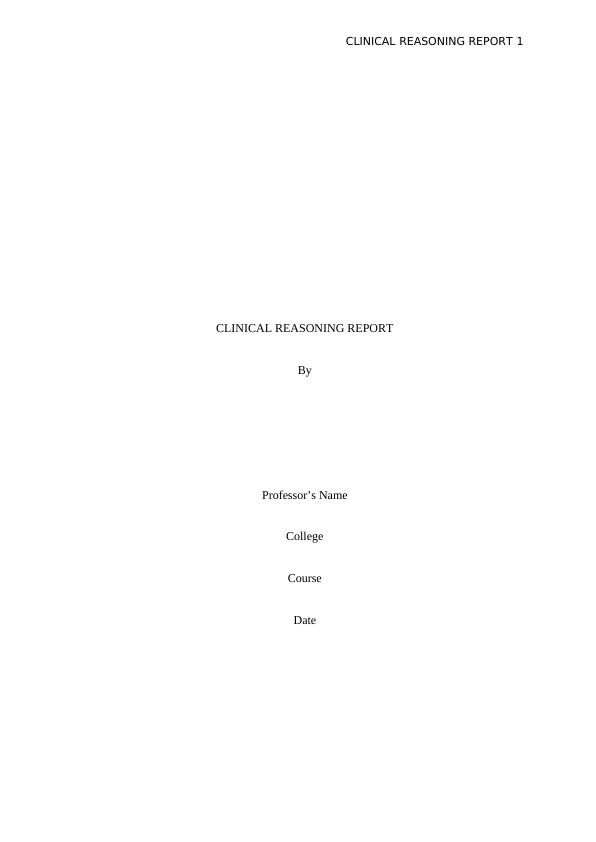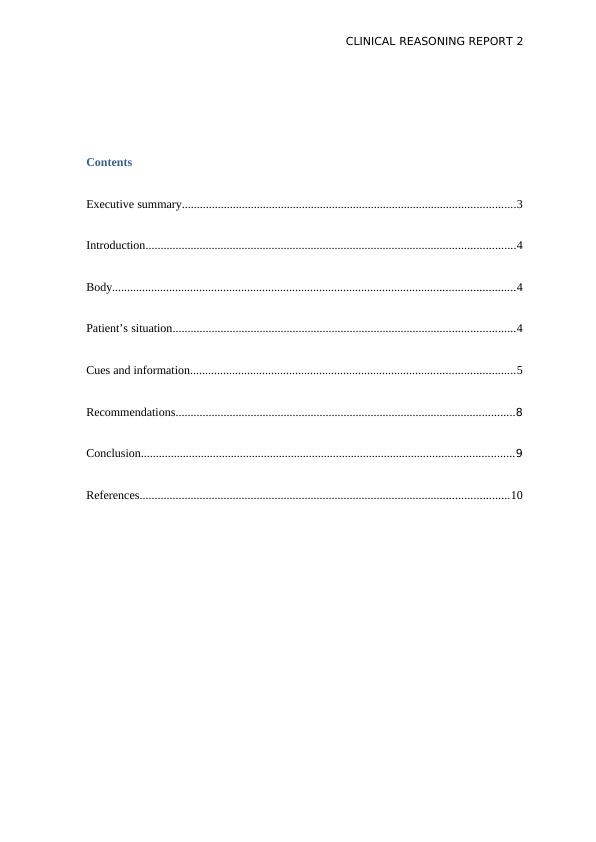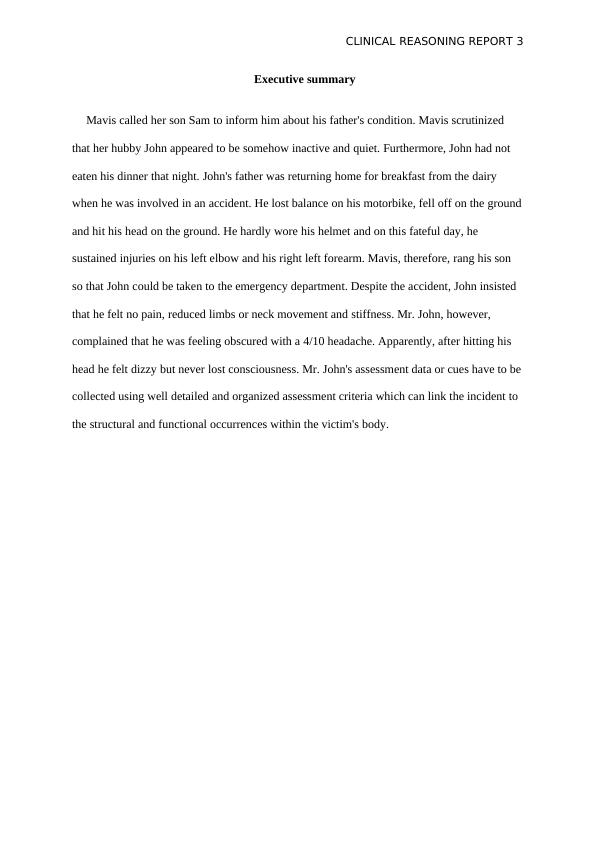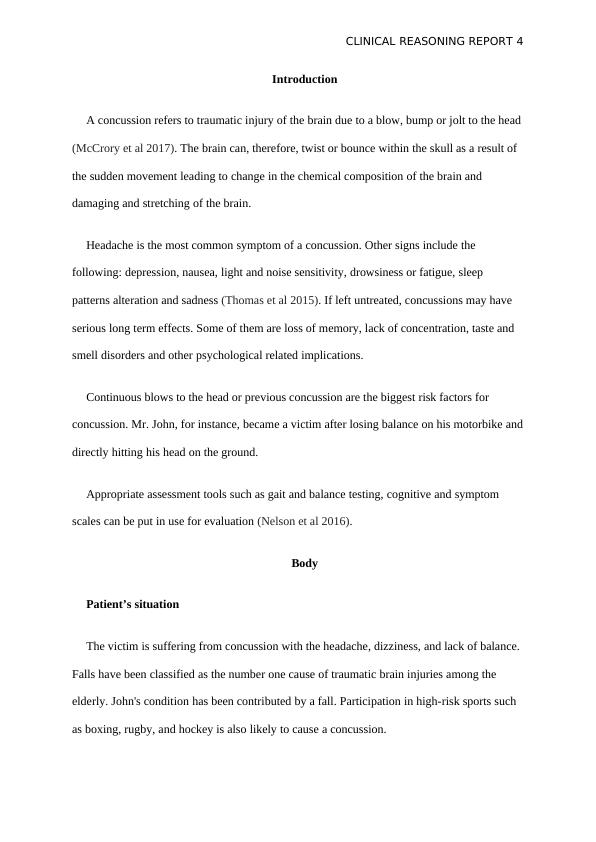Clinical Reasoning Report on Concussion: Symptoms, Assessment, and Recommendations
Added on 2022-10-04
11 Pages2038 Words217 Views
CLINICAL REASONING REPORT 1
CLINICAL REASONING REPORT
By
Professor’s Name
College
Course
Date
CLINICAL REASONING REPORT
By
Professor’s Name
College
Course
Date

CLINICAL REASONING REPORT 2
Contents
Executive summary...............................................................................................................3
Introduction...........................................................................................................................4
Body......................................................................................................................................4
Patient’s situation..................................................................................................................4
Cues and information............................................................................................................5
Recommendations.................................................................................................................8
Conclusion............................................................................................................................9
References...........................................................................................................................10
Contents
Executive summary...............................................................................................................3
Introduction...........................................................................................................................4
Body......................................................................................................................................4
Patient’s situation..................................................................................................................4
Cues and information............................................................................................................5
Recommendations.................................................................................................................8
Conclusion............................................................................................................................9
References...........................................................................................................................10

CLINICAL REASONING REPORT 3
Executive summary
Mavis called her son Sam to inform him about his father's condition. Mavis scrutinized
that her hubby John appeared to be somehow inactive and quiet. Furthermore, John had not
eaten his dinner that night. John's father was returning home for breakfast from the dairy
when he was involved in an accident. He lost balance on his motorbike, fell off on the ground
and hit his head on the ground. He hardly wore his helmet and on this fateful day, he
sustained injuries on his left elbow and his right left forearm. Mavis, therefore, rang his son
so that John could be taken to the emergency department. Despite the accident, John insisted
that he felt no pain, reduced limbs or neck movement and stiffness. Mr. John, however,
complained that he was feeling obscured with a 4/10 headache. Apparently, after hitting his
head he felt dizzy but never lost consciousness. Mr. John's assessment data or cues have to be
collected using well detailed and organized assessment criteria which can link the incident to
the structural and functional occurrences within the victim's body.
Executive summary
Mavis called her son Sam to inform him about his father's condition. Mavis scrutinized
that her hubby John appeared to be somehow inactive and quiet. Furthermore, John had not
eaten his dinner that night. John's father was returning home for breakfast from the dairy
when he was involved in an accident. He lost balance on his motorbike, fell off on the ground
and hit his head on the ground. He hardly wore his helmet and on this fateful day, he
sustained injuries on his left elbow and his right left forearm. Mavis, therefore, rang his son
so that John could be taken to the emergency department. Despite the accident, John insisted
that he felt no pain, reduced limbs or neck movement and stiffness. Mr. John, however,
complained that he was feeling obscured with a 4/10 headache. Apparently, after hitting his
head he felt dizzy but never lost consciousness. Mr. John's assessment data or cues have to be
collected using well detailed and organized assessment criteria which can link the incident to
the structural and functional occurrences within the victim's body.

CLINICAL REASONING REPORT 4
Introduction
A concussion refers to traumatic injury of the brain due to a blow, bump or jolt to the head
(McCrory et al 2017). The brain can, therefore, twist or bounce within the skull as a result of
the sudden movement leading to change in the chemical composition of the brain and
damaging and stretching of the brain.
Headache is the most common symptom of a concussion. Other signs include the
following: depression, nausea, light and noise sensitivity, drowsiness or fatigue, sleep
patterns alteration and sadness (Thomas et al 2015). If left untreated, concussions may have
serious long term effects. Some of them are loss of memory, lack of concentration, taste and
smell disorders and other psychological related implications.
Continuous blows to the head or previous concussion are the biggest risk factors for
concussion. Mr. John, for instance, became a victim after losing balance on his motorbike and
directly hitting his head on the ground.
Appropriate assessment tools such as gait and balance testing, cognitive and symptom
scales can be put in use for evaluation (Nelson et al 2016).
Body
Patient’s situation
The victim is suffering from concussion with the headache, dizziness, and lack of balance.
Falls have been classified as the number one cause of traumatic brain injuries among the
elderly. John's condition has been contributed by a fall. Participation in high-risk sports such
as boxing, rugby, and hockey is also likely to cause a concussion.
Introduction
A concussion refers to traumatic injury of the brain due to a blow, bump or jolt to the head
(McCrory et al 2017). The brain can, therefore, twist or bounce within the skull as a result of
the sudden movement leading to change in the chemical composition of the brain and
damaging and stretching of the brain.
Headache is the most common symptom of a concussion. Other signs include the
following: depression, nausea, light and noise sensitivity, drowsiness or fatigue, sleep
patterns alteration and sadness (Thomas et al 2015). If left untreated, concussions may have
serious long term effects. Some of them are loss of memory, lack of concentration, taste and
smell disorders and other psychological related implications.
Continuous blows to the head or previous concussion are the biggest risk factors for
concussion. Mr. John, for instance, became a victim after losing balance on his motorbike and
directly hitting his head on the ground.
Appropriate assessment tools such as gait and balance testing, cognitive and symptom
scales can be put in use for evaluation (Nelson et al 2016).
Body
Patient’s situation
The victim is suffering from concussion with the headache, dizziness, and lack of balance.
Falls have been classified as the number one cause of traumatic brain injuries among the
elderly. John's condition has been contributed by a fall. Participation in high-risk sports such
as boxing, rugby, and hockey is also likely to cause a concussion.

End of preview
Want to access all the pages? Upload your documents or become a member.
Related Documents
Case Study Analysis of John Wells for Nursing Assignmentlg...
|7
|1853
|241
Clinical Reasoning Cycle Health Assessment 2022lg...
|7
|1905
|14
Brain Injury Induced Concussionlg...
|7
|1828
|194
John Wells Health Case Study 2022lg...
|8
|1974
|9
Nursing Assignment 2022lg...
|7
|1615
|14
Healthcare Case Study: Assessment and Treatment of Concussion in an Elderly Patientlg...
|6
|1717
|395
